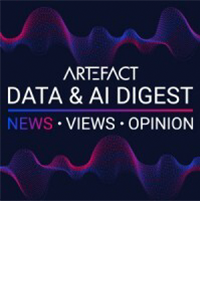Data en zijn toepassingen worden steeds meer geïntegreerd in bedrijfsactiviteiten. Ze staan centraal in de zoektocht naar verbetering van de productiviteit en algehele efficiëntie. Door middel van specifieke processen en een aangepaste organisatiestructuur stelt data governance bedrijven in staat om data te organiseren, de kwaliteit ervan te verbeteren en te voldoen aan de ethische en regelgevende uitdagingen van data verwerking. Een interview door het Hub Instituut met Justine Nerce, Partner bij Artefact.
Justine is een data governance specialist bij Artefact. Op basis van haar ervaring met soortgelijke projecten in grote organisaties bespreekt ze het belang van data governance en Artefact's specifieke positionering op dit gebied. De organisatie, gespecialiseerd in data consulting, is actief in de gehele waardeketen van het bedrijf, van data strategie tot AI projectimplementatie, inclusief governance als een essentiële voorwaarde voor succesvolle implementatie en schaalvergroting van use cases.
Wat zijn vandaag de dag de uitdagingen van data governance?
De hoeveelheid data en het aantal use cases rond data neemt voortdurend toe. Bedrijven staan voor de uitdaging om zoveel mogelijk waarde uit hun data te halen en deze te democratiseren. Goed gedocumenteerde data van goede kwaliteit moet toegankelijk zijn voor de eindgebruiker.
Dit alles is van toepassing binnen het kader van ethiek en data bescherming. Data governance wordt essentieel om naleving van bepaalde privacywetten te waarborgen. In Europa is de General Data Protection Regulation (GDPR) van kracht en deze neigt ernaar de wereldwijde standaard te worden.
Dit betekent dat de organisatie eerst moet kunnen aantonen dat ze weet wat data er door haar infrastructuur stroomt. Ze moet volledig transparant zijn over welke data ze van haar gebruikers verzamelt en in staat zijn om alle data die aan een individu is gekoppeld, onmiddellijk te verwijderen.
Ten tweede is migratie naar de cloud essentieel. Er zijn drie belangrijke toepassingen in opkomst: Business Intelligence, Artificial Intelligence en data . Door data te structureren op basis van data governance kunnen bedrijven deze drie soorten gebruik als een dienst aanbieden.
Deze data producten vormen een gemeenschappelijk, interdisciplinair goed, waarvoor een toegewijd team nodig is. Deze producten moeten van hoge kwaliteit zijn, maar ook zichtbaar en bruikbaar voor iedereen. De uitdaging voor bedrijven is data democratisering. Deze data producten moeten ook veilig en beschermd zijn om te voldoen aan verschillende regelgevende en ethische kwesties.
Hoe ondersteunt Artefact bedrijven bij het implementeren van data governance?
Bij Artefact fungeren we als adviesbureau. We ondersteunen al onze klanten bij de implementatie van data governance, van strategie tot implementatie. Eerst voeren we een audit uit om te zien waar ze staan, daarna stellen we een stappenplan op om de gebieden te identificeren waaraan ze moeten werken. Tot slot bouwen we een data vermogensstructuur in data producten en helpen we bij het kiezen van de technische tools die ze nodig hebben.
In onze adviesaanpak benadrukken we het belang van data als een waardevector voor de organisatie, vervolgens werken we aan de implementatie, de selectie van kwaliteitstools en documentatie van de governance om de strategie inhoud te geven en haalbaar te maken.
We hebben ook onze eigen Artefact School of Data opgezet, waarmee we data stewards en data owners opleiden, essentiële rollen bij de implementatie van data governance voor bedrijven. Naast deze professionele training interveniëren we ook direct bij bedrijven om hen te doordringen van de noodzaak van geavanceerde en ondersteunde data governance om hun AI projecten tot een succes te maken.
Wat is er uniek aan de wereldwijde visie van Artefact?
Onze kracht is dat we een wereldwijd data governancemodel voorstellen, waarbij we ons eerst richten op gevallen van eindgebruik. We positioneren data governance als een "asset" van deze transformatie. We zijn in staat om use cases om te zetten in tastbare waarde en deel uit te maken van een wereldwijd transformatieprogramma.
We hebben ook multidisciplinaire experts. Er zijn ongeveer 20 van ons in Frankrijk die gespecialiseerd zijn in data governance, met profielen met verschillende achtergronden: data product owners die producten modelleren, data stewards die de kwaliteit documenteren en verbeteren, maar ook data ingenieurs en data analisten .
We hebben ook een ecosysteem van technologiepartners met wie we op een agnostische manier samenwerken. We zijn bedreven in alle nieuwe tools die op de markt verschijnen. We hebben zowel technisch als strategisch DNA en kunnen al deze onderwerpen met elkaar verbinden om ze op een holistische en allesomvattende manier te behandelen en in te zetten bij veel klanten.
Heb je een concreet voorbeeld van ondersteuning die je hebt geboden?
We hebben een van onze grote klanten met zeer uitgebreide data assets geholpen bij hun data transformatie. Het project betrof een herontwerp van hun data governance. Toen we halverwege 2017 aankwamen, zagen we dat hun governance vanuit een te technisch en te weinig "zakelijk" perspectief was benaderd. Dit resulteerde in een gebrek aan adoptie van de benodigde tools. Om dit te corrigeren, hebben we hun governance gekoppeld aan hun strategische use cases. Daartoe hebben we de use cases gedocumenteerd, de toegang gedemocratiseerd en de kwaliteit van data verbeterd om goede resultaten te garanderen. De eerste pilots waren een succes! Daarna stonden we voor de uitdaging om op te schalen.
In 2020 hebben we deze organisatie geholpen bij de lancering van een programma om de programma's Artificial Intelligence en de migratie naar het Google Cloud Platform (GCP) te versnellen. Governance werd gepositioneerd als een strategisch onderdeel van hun transformatie en deze lancering werd in twee fasen uitgevoerd:
We gaan nu een derde fase in van de industrialisatie en uitbreiding van dit AI . Als onderdeel van de migratie naar de cloud analyseren we hoe we onze data kunnen structureren, rationaliseren en bundelen. Op dit moment zijn we bezig met de tweede fase, die bestaat uit het structureren van onze data op basis van deze belangrijke bedrijfsfamilies. Vervolgens gaan we nadenken over de ontwikkeling van de data van morgen, die verschillende categorieën van use cases zullen bedienen.
Wat kunnen we in de toekomst verwachten als iedereen zijn data governance heeft geïmplementeerd?
De beschikbaarheid van data zal de implementatie van nog meer use cases mogelijk maken, met name op het gebied van Artificial Intelligence. Dit zal de waardecreatie binnen organisaties versnellen. Het zal ons ook in staat stellen om alle kwesties rondom data democratisering en decentralisatie te ondersteunen, vooral als het gaat om data dichter bij de business te brengen. ArtefactHet is onze missie om deze brug te slaan tussen data en de business, en dat doen we dagelijks met onze klanten. Als de data goed gestructureerd en schoon is, als de producten beschikbaar zijn en als we de drukknop-tools hebben om ze te manipuleren, zal theoretisch over vijf jaar iedereen data in zijn dagelijkse werk kunnen gebruiken!

 BLOG
BLOG






